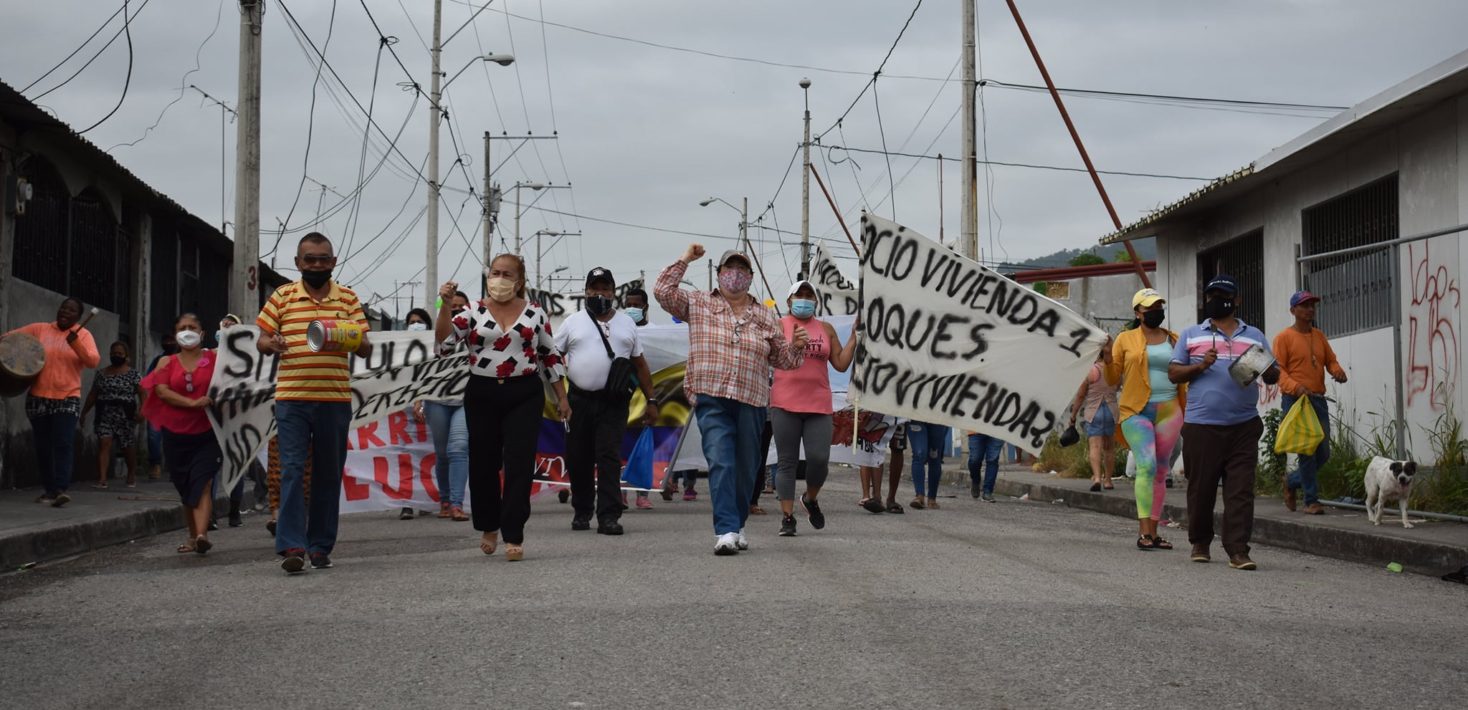Numerous collectives, social movements and communities in the city of Guayaquil and along the coast of Ecuador have been organizing for decades to assert their dignity and fight for the recognition and advancement of their human rights. In the case of Indigenous peoples and communities, the struggle is clearly centuries old. In the eyes of the world, however, the city and the provinces tend to be seen only as the epicentre of violence in the country, a violence that has been rapidly increasing in recent years as a result of the ongoing confrontation between organized criminal groups.
In fact, it was the violence in Guayaquil in January of this year that allowed President Daniel Noboa to justify the continuous state of emergency decrees and situations of “internal armed conflict” that have characterised his government. In practice, these measures have involved the deployment of large-scale police and military operations, the control of the country’s prisons by the armed forces, and the suspension of certain rights, such as the right to peaceful assembly. Measures that have led to allegations of human rights violations, including detentions with little transparency and without due process, the denial of basic guarantees for persons deprived of their liberty, possible acts of torture and other ill-treatment, and continued acts of stigmatization and attacks against human rights defenders
In the face of this hostile environment, the collectives and movements of Guayaquil and Guayas have stepped up their activism. This is not the first time they have faced complex challenges for carrying out their work, and the response has always been community organization and a strengthening of their networks. Their struggle deserves unceasing recognition, all the more so as they are subject to stigmatization by the authorities, including high-ranking officials such as the president and his ministers. This publication aims to do just that. It is by no means an exhaustive account, but one that is full of admiration for the struggle of collectives and movements whose day-to-day work consists of defending the rights of individuals, collectives and nature in the territories of the Ecuadorian coast. It is also an appeal to the authorities to recognize this work, not only by ceasing to stigmatize those who carry it out, but also by taking effective measures to guarantee their protection. In the face of violence and rejection, the enormous dignity with which individuals, collectives and movements defend the rights of all people must always be highlighted.
COMMITTEE OF RELATIVES FOR JUSTICE IN PRISONS

The Committee of Relatives for Justice in Prisons is an association of relatives of people deprived of their liberty, mainly based in Guayaquil but with a national presence, that was created in the context of the prison crisis that Ecuador is experiencing. Since 2018, the country has witnessed numerous prison massacres in which more than 680 people deprived of their liberty have been killed, according to estimates by the Permanent Committee for the Defence of Human Rights (CDH Guayaquil). Deaths in custody are the responsibility of the state. For the Committee of Relatives, it is therefore essential to stress the primary responsibility of the Ecuadorian authorities for lives lost in prisons.
The Committee of Relatives was created on 30 April 2022 and is supported by the International Network of Women Relatives of Persons Deprived of their Liberty (RIMUF). It aims to become a space where relatives can come together to defend the rights of persons deprived of their liberty and their families, including the right to life and full reparation for every family that has lost their sons, husbands, fathers and other loved ones. The Committee and CDH Guayaquil have brought an injunction seeking recognition and access to integral reparation for the violations suffered by persons deprived of their liberty and their families as a result of the prison massacres.
GUAYAS COMMUNITY NETWORK OF DEFENDERS OF NATURE AND HUMAN RIGHTS
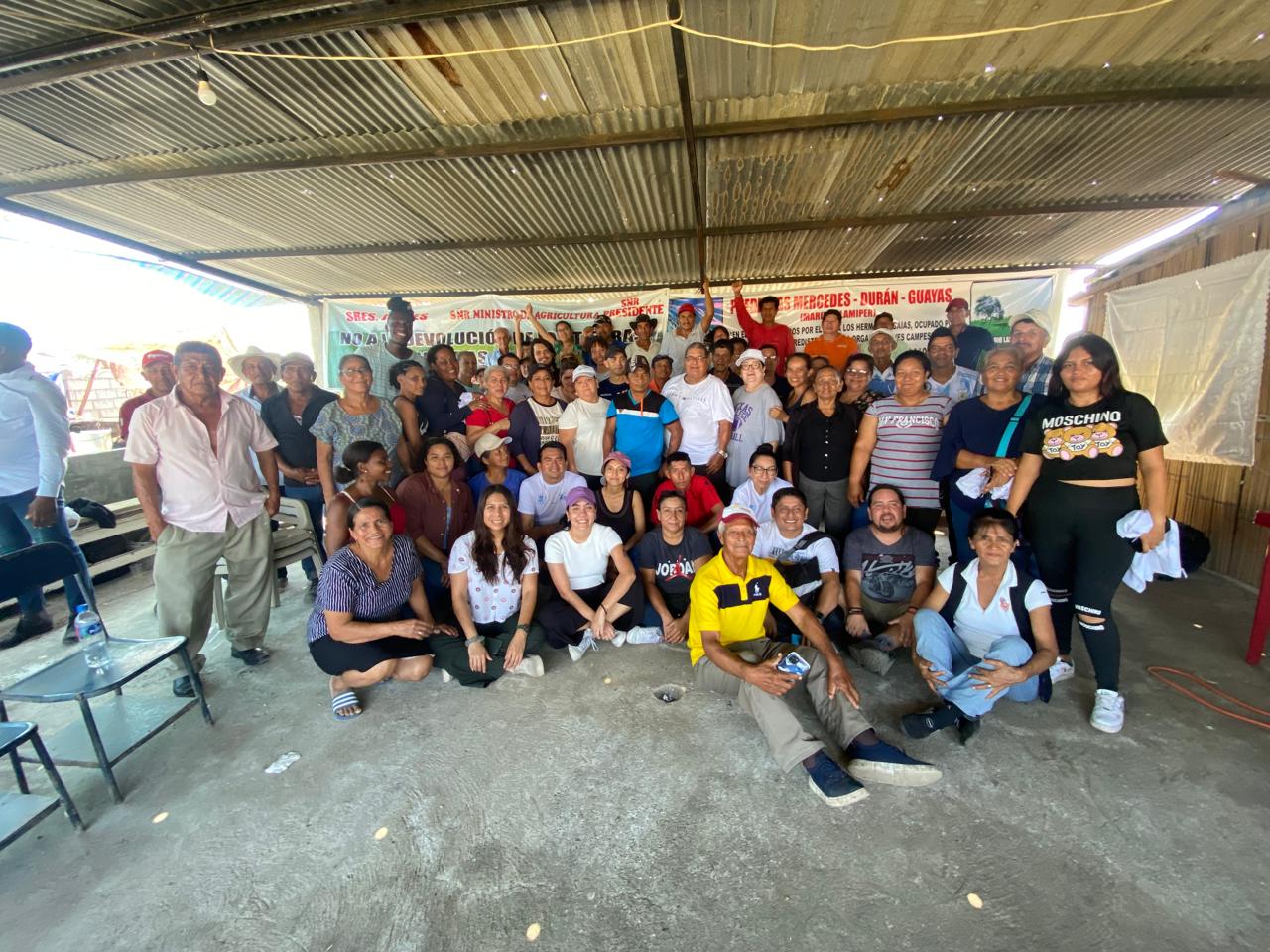
The Community Network of Defenders of Nature and Human Rights, which originated in Guayaquil and Durán, was created with the support of CDH Guayaquil to coordinate the efforts of a number of community leaders. With around eighty leaders trained in human rights, gender, human mobility and more, the network has been instrumental in promoting, defending and upholding rights in their communities. Among its most notable achievements are the development of community outreach plans, food security management during the pandemic, social work brigades, advocacy for decent housing, and the creation of a community human rights school. The network aims to establish itself as a community-based social movement in Guayaquil, inspired by the successful experiences of other movements in Ecuador and committed to fighting for the dignity and rights of communities.
Together with CDH Guayaquil, the network continuously monitors possible human rights violations in Guayas, including police abuses, forced evictions, denial of social rights such as health or education to priority groups, and threats to human rights defenders. The network has actively mobilized to denounce the actions of the security forces in the context of police and military operations related to the current government’s state of emergency decrees.
SOCIAL YOUTH MOVEMENT OF GUAYAQUIL
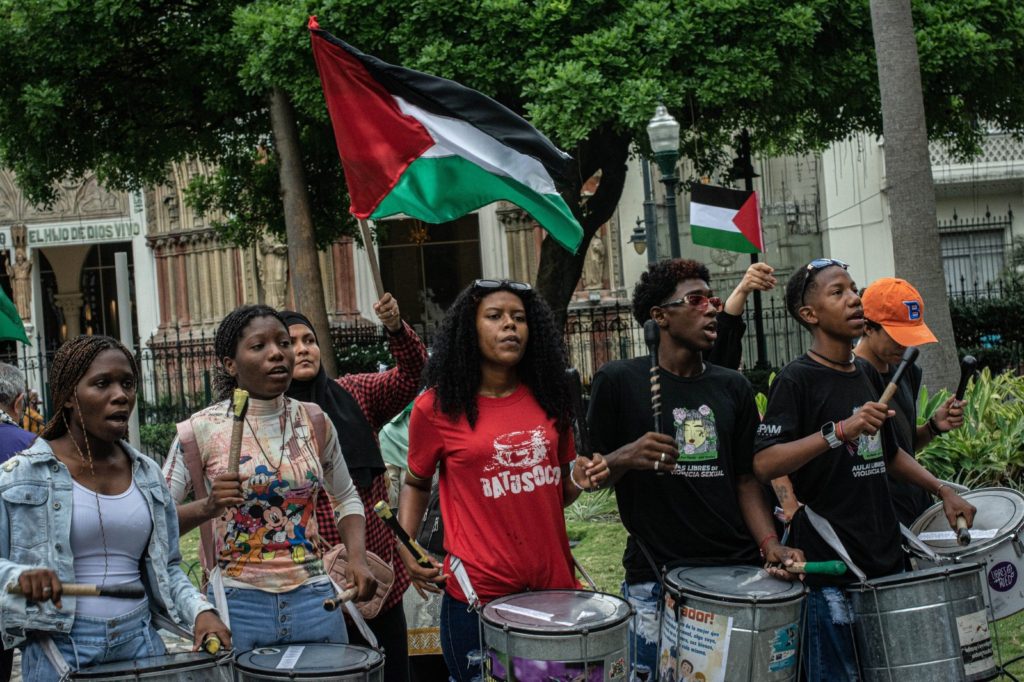

The Social Youth Movement of Guayaquil, made up of more than 300 adolescents and young people from the popular and peripheral sectors of Guayaquil, has been fighting for anti-racist, class and gender justice for four years. It was born out of the need for adolescents and young people to use their voices to engage in processes of political advocacy, artivism and social mobilization for the exercise of their rights. The movement also focuses on building leadership skills and social engagement and promoting positive change in their communities in a context of structural and criminal violence that directly affects their livelihood aspirations.
As a result, eight organizations (Batucadas Populares, Desacato Desde el Inicio, Fundación Nia Kali, Movimiento Mi Cometa, Espacio Juvenil rural – Progreso, Espacio Juvenil del NorOeste: Wambra Runa, Crearte Joven and Pasos & Huellas) have become active in processes for improving access to their rights and strengthening their communities. These include the demand for compliance with the ruling of the Inter-American Court of Human Rights in the case of Paola Guzmán Albarracín vs. Ecuador, related to the inclusion of comprehensive sexual education in the Ecuadorian education system; participation in the creation of a state plan for the inclusion of comprehensive sexual education in Guayaquil; the performance Youth Advocacy through Art; and the formative process Ritmos del Suburbio (Rhythms from the Suburbs), among others.
SOCIO VIVIENDA FOR THE DEFENCE OF DECENT HOUSING
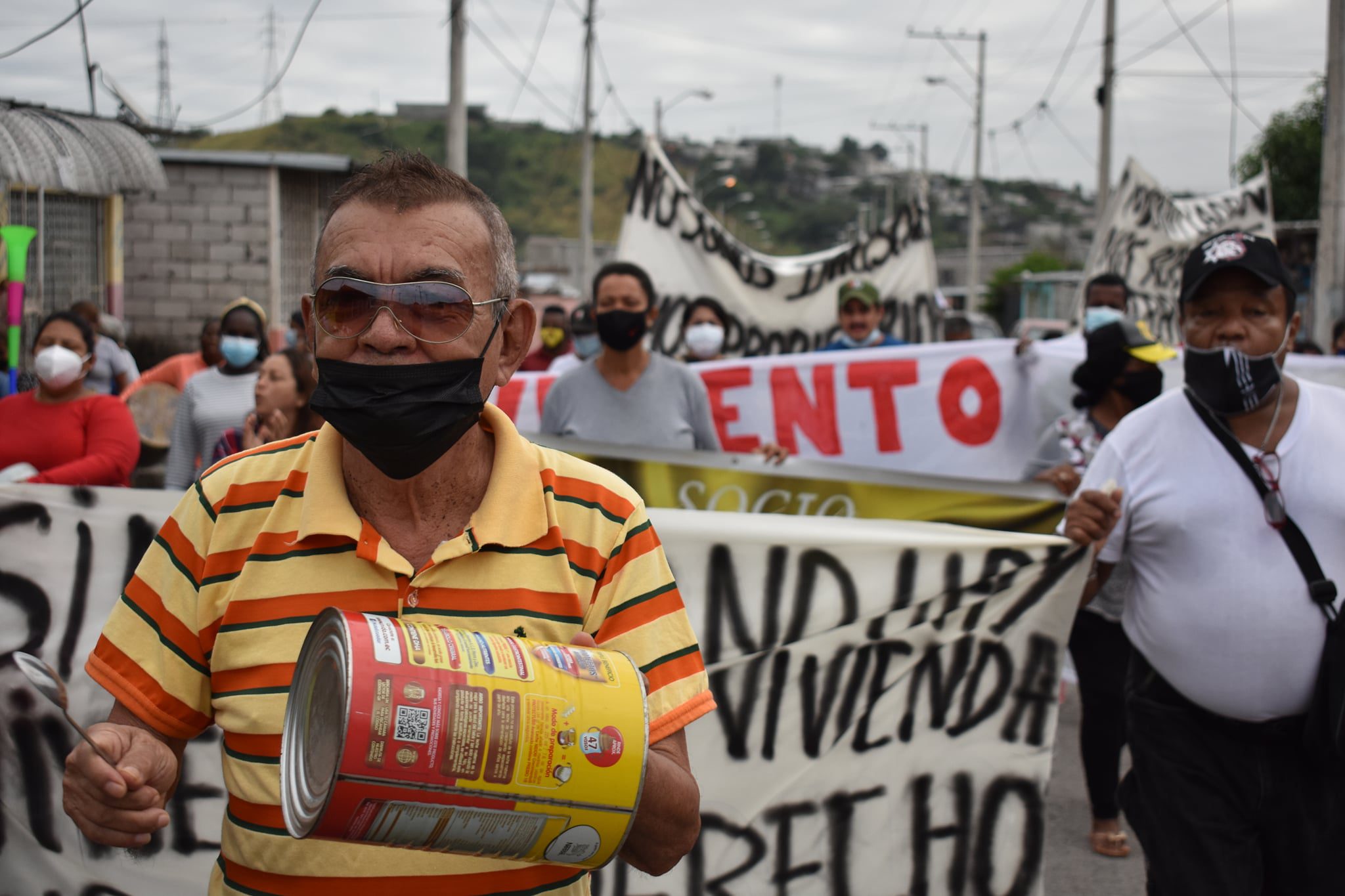
Members of the Socio Vivienda community are organizing to defend their right to decent housing and social security, particularly in a sector of Guayaquil affected by ongoing violence and military and police operations. Between 2010 and 2012, the Ministry of the Environment and the Technical Secretariat for Irregular Human Settlements worked to implement the “Ecological Plan for Guayaquil”, a policy that resulted in the forced relocation of low-income families and families living in high-risk sectors, including an estuary in Guayaquil, to housing complexes known as Socio Vivienda I and II. When the houses were handed over, the families did not receive any documents confirming the ownership of their homes, thus leaving them vulnerable to eviction. CDH Guayaquil has documented multiple threats of eviction against these communities since 2013, as well as numerous cases of police and military abuse. There is also a serious security crisis in the sector due to state neglect and the presence of organized criminal groups. Under the current government, the presence of the security forces continues to be a constant feature.
On Thursday 9 December 2021, CDH Guayaquil and the Socio Vivienda community filed an injunction against the Ministry of Urban Development and Housing (MIDUVI), demanding that a process be initiated to secure the title to these homes in accordance with international human rights standards. The case is currently before the Constitutional Court and could become a benchmark for decent housing and public policy in similar contexts.
ANCESTRAL COASTAL COMMUNES IN DEFENCE OF THEIR TERRITORIES: OLÓN AND BAJADA DE CHANDUY
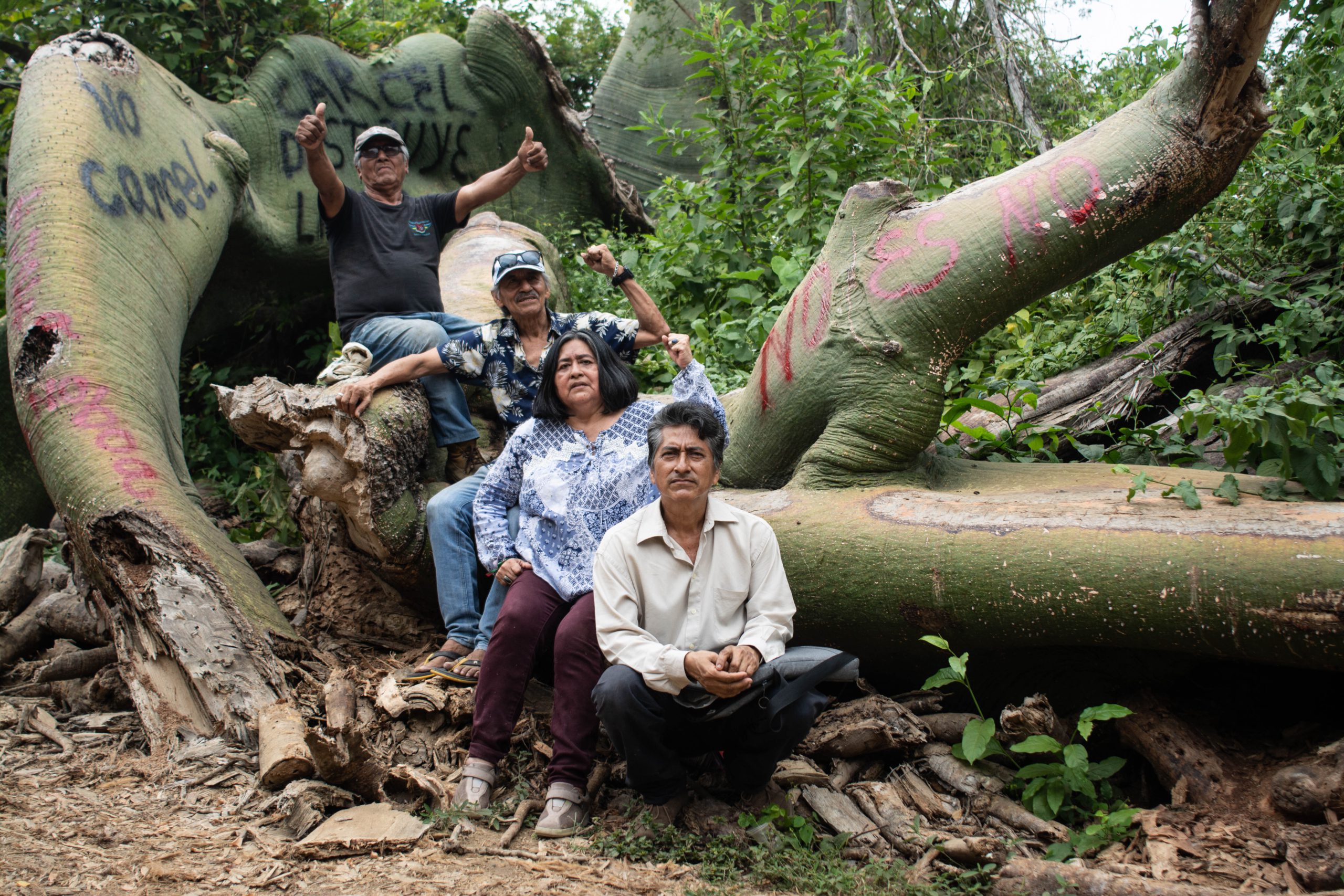
Members of the Bajada de Chanduy ancestral commune have been engaged in a historic struggle to defend their communal lands, which have been systematically plundered by private individuals and agricultural companies. These actors have invaded ancestral territory, violating the collective rights of the community and putting their traditional way of life at risk. Despite these threats, the communities have resisted, standing firm to protect their territories and demanding that their rights, including free, prior and informed consent, be respected.
This struggle has intensified with the construction of a mega prison within their territory, pushed through by President Daniel Noboa. According to the commune members, this project has been imposed on them without prior consultation and without an environmental impact assessment, effectively depriving the community of land they have cared for for generations. For the community, the construction of the mega prison will not only destroy a priceless natural heritage, but could also facilitate the entry of organized criminal groups, thus disrupting the peaceful community life that characterizes the community. Despite its proximity to the city of Guayaquil, this community has preserved its ancestral traditions, based on peaceful coexistence and the conservation of nature, a culture that would be seriously threatened by this prison project.
Olón, an ancestral commune also located in the province of Santa Elena, is made up of descendants of the Huancavilca Indigenous Peoples. In May 2024, the community organized a peaceful protest to express their opposition to a construction project that they believe would endanger an estuary they have historically used, and to the felling of trees in their territory. Prior to the protest, community members had already expressed their opposition to the project at two community meetings, but the plans continued to move forward. In response to the protest, the authorities launched a major security operation. In this context, the community of Olón is demanding an audit of permits and title deeds, and respect for their collective rights as members of a communal territory.
Written by:
Fernando Bastias Robayo is a lawyer working on strategic litigation and community advocacy for CDH Guayaquil
Paul Murillo Ontaneda is a Community Officer for Organizational and Community Strengthening at CDH Guayaquil
Camila Ruiz Segovia is the South America Campaigner at Amnesty International


